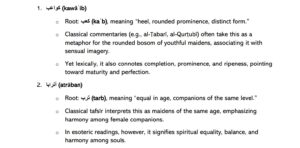
Introduction
Among the Qur’an’s many depictions of Paradise, the verses in Surat al-Nabaʾ (78:32–33) stand out for their symbolic richness and interpretive complexity. At first glance, these verses are often understood through a literalist lens that emphasizes material and sensual pleasures. Yet the language of the Qur’an, especially when considered through its etymological depth and the Sufi hermeneutic tradition, reveals meanings that transcend physical imagery.
This essay aims to provide a progressive, rational, and esoteric reading of these verses, moving beyond superficial depictions of heavenly reward and unveiling their deeper significance for the soul’s journey toward perfection.
The Qur’anic Text

Classical and Lexical Understandings
The two key words in this verse are (كواعب) kawāʿib and (أترابا) atrāban:

A Sufi and Esoteric Reinterpretation
From a Sufi perspective, Paradise is not simply a physical realm of delights but the symbolic unveiling of spiritual truths. Thus, verses that seem sensuous at the surface often carry profound mystical meanings.
• “Kawāʿib” (mature, complete, prominent):
This refers not to bodily form but to the soul reaching its perfection, the ripeness of spiritual beauty. Just as fruit ripens and reveals its sweetness, so too does the human soul, through purification (tazkiyah) and remembrance of God (dhikr), reach the fullness of its being.
• “Atrāban” (equal, harmonized):
This expresses the state of souls in harmony with one another, no longer fragmented by ego, gender, or worldly hierarchies. In Paradise, companionship is based not on physical form but on spiritual resonance—a perfect equality of maturity, love, and presence before God.
Thus, these verses, when read esoterically, describe the companionship of perfected souls: beings who have transcended material divisions and entered the eternal harmony of divine presence.
Toward a Modern and Progressive Reading
In modern contexts, literalist readings that depict Paradise as a place of sensual pleasures often reinforce patriarchal imaginations, where women are objectified as rewards for men. Such nterpretations contradict both the Qur’an’s universal address and its insistence on justice and equality. By recovering the original lexical roots and the Sufi interpretive tradition, we arrive at a reading that:
• Removes gender exclusivity: The verse speaks not only of women but of all perfected souls.
• Centers spiritual growth: Paradise is the realm where the soul attains completion and harmony, not where bodily desires are magnified.
• Affirms equality: Companionship in Paradise is marked by balance, equity, and mutual dignity, reflecting the Qur’anic ethic of justice.
This aligns with the Qur’anic principle:

Conclusion
When read superficially, Surat al-Nabaʾ 78:32–33 appears to promise physical companionship as a heavenly reward. But through a deeper engagement with the Arabic roots and Sufi hermeneutics, the verses reveal a vision of spiritual perfection and harmony.
Paradise, in this reading, is not an eternal feast of sensual pleasures, but the soul’s homecoming to maturity, beauty, equality, and companionship in the Divine presence. It is a reminder that the Qur’an’s imagery, when read with depth and openness, speaks not to the body’s desires but to the soul’s longing for completion.
References
• The Qur’an, 78:32–33 (Arabic text)
• Abdel Haleem, M.A.S. The Qur’an: A New Translation. Oxford University Press, 2005.
• Ibn ʿArabī, Futūḥāt al-Makkiyya.
• Al-Qurṭubī, al-Jāmiʿ li-Aḥkām al-Qur’an.
• Seyyed Hossein Nasr, The Garden of Truth.
• William Chittick, The Sufi Path of Knowledge.


